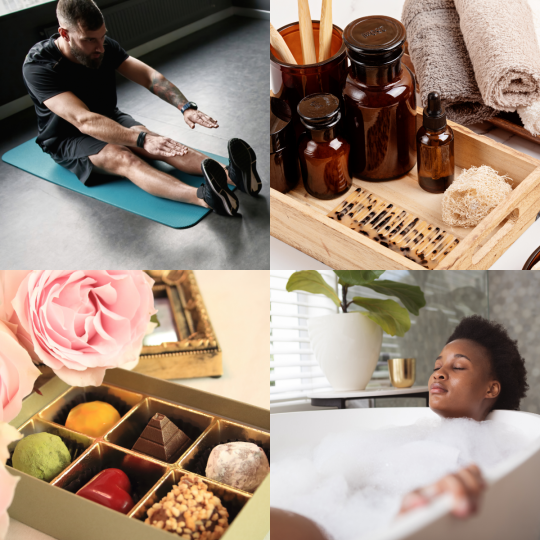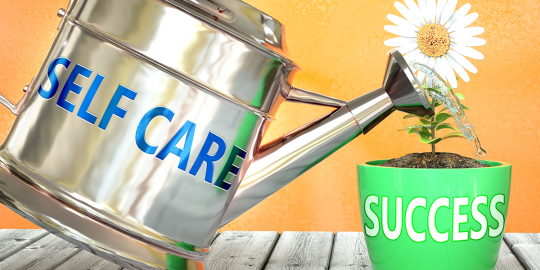24th July marks International Self-Care Day which aims to put a focus on the importance of personal physical and mental health and wellbeing. The International Self-Care Foundation says the day exists “to promote self-care as a vital foundation of health,” and highlights ways we can practice self-care, as well as the impact it will have on our daily lives. After all, you can’t pour from an empty cup, and taking care of our own health is key to managing most other aspects of our lives. In order to work, parent, and maintain successful and happy relationships, we need to feel good, and how better to do that than take some time to check in with ourselves.
Importance of self-care
So, what exactly is self-care?
The International Self-Care manifesto describes self-care as “a practical, person-centred set of activities that we should all be undertaking to maintain our health, wellness and wellbeing.” It is becoming recognised more and more as being an integral part of our daily lives and routines, and there are many ways in which we can practice self-care at home and at work including:
- Taking time to do something that you want to do (reading a book, going for a walk or run, watching a movie, painting, baking). Doing something that gives you enjoyment and feelings of happiness can help alleviate anxiety and stress and can help achieve a calm mindset.
- Talking to someone if you’re feeling low (a friend, relative, counsellor, or therapist). When your mood is low it is incredibly important to speak to someone that makes you feel safe. Whether that’s a friend or a mental health professional, talking will help you decipher the cause of the issue which will in turn allow you to find a solution.
- Staying as healthy as possible (nutritious food, exercise). Exercise not only keeps us physically healthy but creates endorphins, feel-good hormones. Nutrition also affects hormone production and if our hormone levels dip we can feel irritated, depressed, anxious or stressed. Not eating regularly enough can also have some unwanted effects such as fatigue, headaches, low energy and inability to focus. Food really is the fuel that keeps us going.
- Maintaining healthy relationships (spending time with loved ones). We are social creatures who need social interaction with people we care about. Isolation can be a leading cause of depression and anxiety, so spending time with friends and family will help maintain good mental health.
- Being kind to yourself (eat something tasty, buy something new, pamper yourself). It’s very easy to treat others kindly and completely forget about ourselves, but we all need kindness in our lives, and sometimes that needs to come from within.
- Learning something new. We are curious by nature and our brains are screaming out to acquire new skills. A baby is desperate to learn to walk and talk and jump and build, and we never lose that desire. Allowing yourself time to continue to learn will satiate your brain’s Thirst for knowledge and keep it young, agile and better able to deal with stress and strain!

What happens if we don’t practice self-care?
According to PsychCentral, a lack of self-care can lead to a number of issues including:
- Low energy
- Feeling hopeless
- Increased headaches, stomach aches, and other physical symptoms of stress
- Difficulty falling and staying asleep
- Worsening mental health symptoms like depression or anxiety
- Feeling “burnout”
- Difficulty concentrating
- Strain or distancing in the relationship with your spouse or partner
- Reduced performance at work
- Less motivation to engage in social activities
- Less able to cope with challenging or stressful situations and increased irritability
All of these negative effects of neglecting to take care of ourselves properly can greatly impact our lives and others around us, which is why it’s imperative that we recognise that self-care isn’t a luxury, but a necessity.

Why now?
In the past, self-care was often seen as indulgent or narcissistic and talking to a therapist or spending time working on ourselves goes very much against that great British ‘stiff upper lip’ mentality. Thankfully, taking ownership of our health, both mental and physical, is now acknowledged as being a good thing, and is actively encouraged in most settings including the workplace.
Self-care at work
Monica Thakrar, a Forbes Council member, explains “helping leaders and employees take care of themselves while still getting results for the organisation can lead to higher morale, engagement and performance.” She continues, “in order to create well-being in their workforce, leaders must create a culture where self-care is encouraged and enhanced. This is most effective when top leadership models the behaviour they want to see in their organisation.” Essentially, a culture of self-care needs to filter down from leaders who actively partake in self-care themselves.
What is ‘intellectual health’?
This refers to being curious and open to learning new things, and actively looking at the things you think you know from different perspectives. Upskilling or acquiring entirely new skills is not only rewarding and satisfying, but can lead to more well-rounded employees, and better leaders within your organisation. Instilling and actively promoting learning within your business will reiterate how much you value your team and will demonstrate to them that self-care can absolutely take place at work.
Learning at work
We recently wrote a blog about the benefits of incorporating L&D into the working day which included:
- Making staff feel happier and more valued meaning they’ll perform better
- Boosting productivity
- Retaining talent (and attracting new talent)
- Improving skills and knowledge overall
We can now add ‘promoting self-care’ to the list.

By using a learning platform like Thirst, you are offering your employees the chance to design their own learning journey. Empowering your workforce by actively supporting their growth will show them that a) you believe in them and b) you want them to do big things. Have a conversation about self-care with your team, show them that working on themselves is incredibly important, and introduce them to Thirst as a first step in their self-care journey.
Remember – self-care is an ongoing process and very much a learning journey in itself. The things involved in your self-care practice now will likely change and evolve as our lives continue to change and evolve, but we know there are some things that our bodies and brains will always need including positive people in our lives, experiences we’ll cherish forever, and personal growth.







